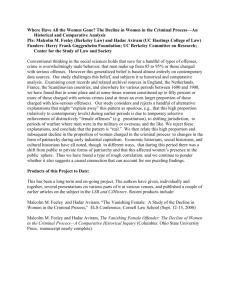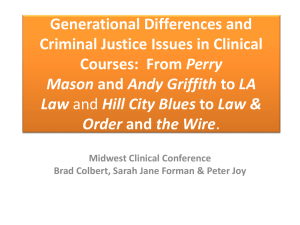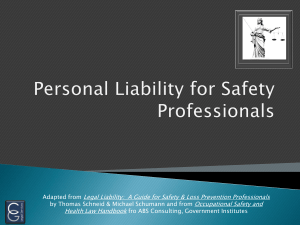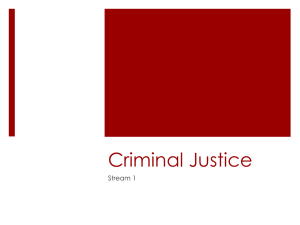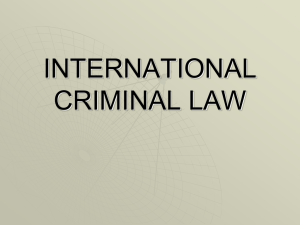Texas Bar Presentation Marc Levin Texas Public
advertisement
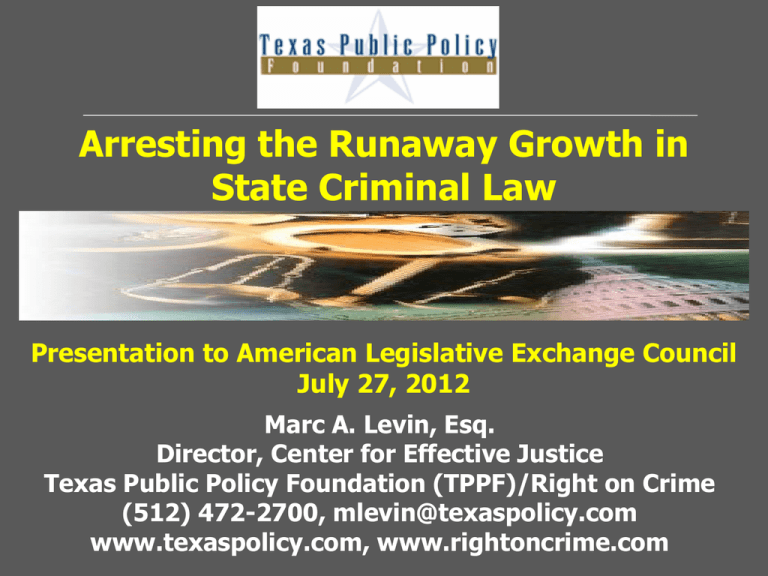
Arresting the Runaway Growth in State Criminal Law Presentation to American Legislative Exchange Council July 27, 2012 Marc A. Levin, Esq. Director, Center for Effective Justice Texas Public Policy Foundation (TPPF)/Right on Crime (512) 472-2700, mlevin@texaspolicy.com www.texaspolicy.com, www.rightoncrime.com TPPF Mission: Individual Responsibility, Free Enterprise, Limited Government, Private Property Rights We apply these foundational principles to criminal justice, bringing together stakeholders and working with policymakers and allies across the spectrum. Fiscal and tax restraint Civil justice reform (worked to enact loser pays in 2011) Center for Tenth Amendment Studies Deregulation of (over)regulated industries like insurance and utilities. Center for Effective Justice launched in March 2005, Right on Crime in Dec. 2010 Former Governor Jeb Bush, Speaker Newt Gingrich, Former Drug Czar Bill Bennett, Former A.G. Ed Meese, Grover Norquist, and Other Conservative Leaders Endorse Right on Crime Statement of Principles Statement Supports Reining in Growth of Non-Traditional Criminal Laws, Cost-Effective Alternatives for Nonviolent Offenders, Emphasis on Restitution and Treatment, and Performance Measures. Conservatives Latch on to Prison Reform January 28, 2011 Right on Crime Noted in “Budget Crunch Forces New Approach to Prisons” February 15, 2011 National Review Praises Right on Crime February 21, 2011 No inventory of all state criminal laws is available, which itself adds uncertainty to the business climate. We do know many states have thousands of criminal laws, including some 1,700 statutory offenses in Texas. Texas has 11 felonies relating to harvesting oysters and in the gulf states of Texas, Louisiana, Mississippi, Alabama, and Florida, there are some 715 environmental criminal offenses alone. Many of these laws dispense with the traditional requirement of a culpable mental state. For example, of the 83 environmental criminal offenses in Florida, 52 are strict criminal liability offenses. In Alabama, “disposing of scrap tires in a way not approved by the Environmental Management Act” is a felony punishable by up to ten years in prison, even if no harm. Under the TX. Water Code, “transporting or causing or allowing to be transported for storage, processing, or disposal, any hazardous waste to any location that does not have all required permits” is punishable by up to ten years behind bars, even if the waste is not actually stored at the location that lacks permits and there is no harm. State offenses often confer virtually unlimited authority on agencies to effectively create new criminal offenses through their rulemaking. For example, in Louisiana, RS 30:2421A creates an offense with a one year prison term for “disposing of white goods (appliances) except in a collection or recycling facility in accordance with the rules and regulations of the department.” Alaska’s corporate criminal liability statute exposes organizations to criminal liability for the actions of their agents, as long as agents intended the organization to benefit from their actions. It also specifies that organizations cannot disclaim liability through codes of conduct or corporate policies; their liability extends beyond any merger, consolidation, or dissolution; and that convicted organizations can be subjected to larger fines than the convicted individual. Stop creating new criminal offenses as a method of regulating non-fraudulent business activities. Regulation is better handled through non-criminal administrative mechanisms and market forces, not the heavy stigma of criminal sanctions. Revise criminal laws to remove ambiguities and consolidate redundant laws to help prevent prosecutorial abuse. Convert many regulatory misdemeanors into civil violations or, at the least, remove jail time as an option for such offenses, provided that the non-jail penalty is satisfied. Economic conduct should be criminal only when it results in actual harm or danger, except if there is intentional fraud such as Madoff. Create interim committees and commissions to develop and submit comprehensive, consensus reform packages to lawmakers at the beginning of legislative sessions. These bodies would identify criminal laws that are unnecessary, duplicative, overbroad, excessively vague, lacking an appropriate culpable mental state, create vicarious liability, or are otherwise deficient, and incorporate their work into one omnibus bill. An interim commission in 2010 in South Carolina resulted in a package enacted almost unanimously by lawmakers that included significant sentencing and probation reforms relating to traditional criminal offenses. Applies default rule that the following culpable mental state applies to all elements of the offense if one is not provided in the statute: (a) with the conscious object to engage in conduct of the nature constituting the element; (b) with the conscious object to cause such a result required by the element; (c) with an awareness of the existence of any attendant circumstances required by the element or with the belief or hope that such circumstances exist; and (d) with either specific intent to violate the law or with knowledge that the person’s conduct is unlawful. Enact ALEC Rule of Lenity Model Bill This due process protection provides that state laws are construed against the government when there is doubt as to whether the Legislature intended to criminalize the conduct at issue, ensuring there is fair notice concerning the line between legal and criminal behavior. Parallels conservative emphasis on strict interpretation of Constitution. Enact ALEC Transparency & Accountability in Criminal Law Measure This requires: A detailed state and local fiscal note on all bills creating or enhancing an offense. Reference to new offense or enhancement in caption of bill. Elimination of provisions that delegate power to agencies to create offenses through rulemaking. Require approval of new offenses and sentencing enhancements by the legislative committees overseeing criminal justice system. Require sunrise review of new proposals similar to the sunset process, which is done for certain measures such as those involving occupational licensing in states like Arizona and Oregon. Sunset criminal laws outside of the Penal Code. These statutes, such as Section 7.03 of the Texas Water Code, can prevent local prosecutors and the Attorney General from bringing a prosecution when the same conduct is the subject of pending or resolved administrative proceeding before a state agency. Remove fiscal incentives to bring criminal cases. Arrangements in some states that allow a division within the office of the Attorney General or prosecutor to keep the “winnings” from settlements or fines in cases should be repealed. Review state bar rules and processes relating to prosecutorial misconduct to ensure there are sufficiently strong statutes and actual enforcement occurs. Statutes should require that attorney generals, as well as local prosecutors whose offices receive state funds, submit reports similar to other agencies accounting for the time and money spent on various types of cases, separating expenses on criminal cases involving crimes in the Penal Code versus those involving regulatory offenses that do not directly implicate public safety. Expand the availability of informal processes for expeditious case resolution such as mediation and create a presumption for the use of such processes in appropriate cases. Mediation is confidential, not an admission of wrongdoing, and resolution must be restorative not punitive. Options are restitution and/or community service. Prohibit arrest for regulatory misdemeanors unless the charged individual fails to respond to a summons or emergency danger to humans. Being arrested can create a permanent record, compromise an individual’s ability to defend themselves, and be used in cases to gather personal information and effects when a court might not have found sufficient basis for a search warrant. We partner with State Policy Network member think tanks, assisting them with research and legislative outreach. We are identifying high priority states in 2013 where conditions are ripe for reform. Work with SPN counterpart to distribute papers such as the checklist and “12 Steps for Overcoming Overcriminalization”, hold events, draft legislation and find sponsor, and prepare and deliver testimony. Continued efforts through ALEC. Partner with state business and trade groups and legislative liaison for individual companies to identify threats and opportunities. Conduct additional research, issue papers, and identify specific cases to spotlight in policymaker and media outreach.



